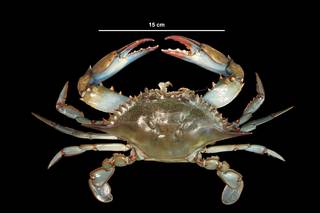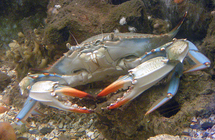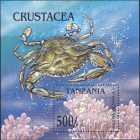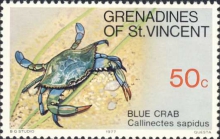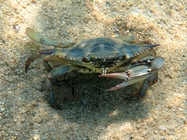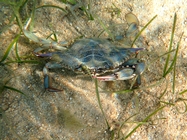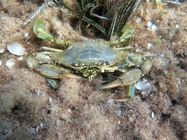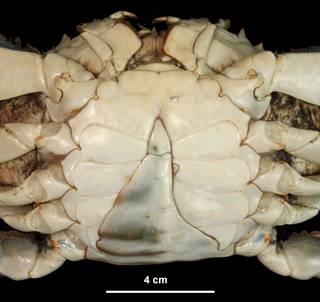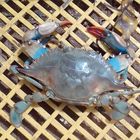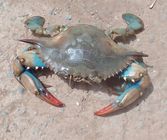Scheldt species taxon details
Callinectes sapidus Rathbun, 1896
107379 (urn:lsid:marinespecies.org:taxname:107379)
accepted
Species
marine, brackish, fresh, terrestrial
recent + fossil
Rathbun, M. J. (1896). The genus <i>Callinectes</i>. <em>Proceedings of the United States National Museum.</em> 18(1070): 349-375, Pls. XIII-XXVIII., available online at https://doi.org/10.5479/si.00963801.18-1070.349 [details] 
DecaNet eds. (2025). DecaNet. Callinectes sapidus Rathbun, 1896. Accessed through: VLIZ Consortium Scheldt Species Register at: https://scheldemonitor.nl/speciesregister/aphia.php?p=taxdetails&id=107379 on 2025-09-11
VLIZ Consortium. Scheldt Species Register. Callinectes sapidus Rathbun, 1896. Accessed at: https://www.scheldemonitor.org/speciesregister/aphia.php?p=taxdetails&id=107379 on 2025-09-11
Date
action
by
original description
Rathbun, M. J. (1896). The genus <i>Callinectes</i>. <em>Proceedings of the United States National Museum.</em> 18(1070): 349-375, Pls. XIII-XXVIII., available online at https://doi.org/10.5479/si.00963801.18-1070.349 [details] 
context source (Introduced species) Fofonoff, P.W.; Ruiz, G.M.; Steves, B.; Carlton, J.T. (2014-2024). National Exotic Marine and Estuarine Species Information System (NEMESIS). , available online at http://invasions.si.edu/nemesis [details]
context source (Schelde) Maris, T., O. Beauchard, S. Van Damme, E. Van den Bergh, S. Wijnhoven & P. Meire. (2013). Referentiematrices en Ecotoopoppervlaktes Annex bij de Evaluatiemethodiek Schelde-estuarium Studie naar “Ecotoopoppervlaktes en intactness index”. [Reference matrices and Ecotope areas Annex to the Evaluation methodology Scheldt estuary Study on “Ecotope areas and intactness index”. <em>Monitor Taskforce Publication Series, 2013-01. NIOZ: Yerseke.</em> 35 pp. (look up in IMIS) [details]
context source (Bermuda) Markham, J. C.; McDermott, J. J. (1980). A tabulation of the Crustacea Decapoda of Bermuda. Proceedings of the Biological Society of Washington, 93(4): 1266-1276 [details]
basis of record Türkay, M. (2001). Decapoda, <B><I>in</I></B>: Costello, M.J. <i>et al.</i> (Ed.) (2001). <i>European register of marine species: a check-list of the marine species in Europe and a bibliography of guides to their identification. Collection Patrimoines Naturels,</i> 50: pp. 284-292 (look up in IMIS) [details]
additional source Meinkoth, N. A. (1981). Field guide to North American seashore creatures. <em>The Audubon Society.</em> 1-799. [details]
additional source Pollock, L.W. (1998). A practical guide to the marine animals of northeastern North America. Rutgers University Press. New Brunswick, New Jersey & London. 367 pp., available online at http://books.google.com/books?id=i1AmT31cuR4C [details]
additional source Muller, Y. (2004). Faune et flore du littoral du Nord, du Pas-de-Calais et de la Belgique: inventaire. [Coastal fauna and flora of the Nord, Pas-de-Calais and Belgium: inventory]. <em>Commission Régionale de Biologie Région Nord Pas-de-Calais: France.</em> 307 pp., available online at http://www.vliz.be/imisdocs/publications/145561.pdf [details]
additional source Streftaris, N., A. Zenetos & E. Papathanassiou. (2005). Globalisation in marine ecosystems: the story of non-indigenous marine species across European seas. <em>Oceanogry and Marine Biology: an Annual Review.</em> 43: 419-453. (look up in IMIS) [details] Available for editors
additional source Zenetos, A., M.E. Cinar, M.A. Pancucci-Papadopoulou, J.G. Harmelin, G. Furnari, F. Andaloro, N. Bellou, N. Streftaris & H. Zibrowius. (2005). Annotated list of marine alien species in the Mediterranean with records of the worst invasive species. <em>Mediterranean Marine Science.</em> 6 (2): 63-118., available online at https://www.researchgate.net/publication/273213810_Annotated_list_of_marine_alien_species_in_the_Mediterranean_with_records_of_the_worst_invasive_species [details] Available for editors
additional source Felder, D. L., Álvarez. F.,Goy, J.W. & Lemaitre, R. (2009). Decapoda (Crustacea) of the Gulf of Mexico, with comments on the Amphionidacea,. <em>Felder, D.L., and Camp, D.K. (eds), Gulf of Mexico - Origins, Waters, and Biota. Vol. 1. Biodiversity.</em> Pp. 1019–1104 (Texas A&M University Press: College Station, Texas)., available online at http://biogomx.net/sites/default/files/pdfs/chapters/59-Felder%20et%20al%202009-Decapoda%20of%20the%20GoMx.pdf [details]
additional source Occhipinti-Ambrogi, A., A. Marchini, G. Cantone, A. Castelli, C. Chimenz, M. Cormaci, C. Froglia, G. Furnari, M.C. Gambi, G. Giaccone, A. Giangrande, C. Gravil, F. Mastrototaro, C. Mazziotti, L. Orsi-Relini & S. Piraino. (2010). Alien species along the Italian coasts: an overview. <em>Biological Invasions.</em> 13(1): 215-237., available online at https://doi.org/10.1007/s10530-010-9803-y [details] Available for editors
additional source Zenetos, A., S. Gofas, M. Verlaque, M. Cinar, J. Garcia Raso, C. Bianchi, C. Morri, E. Azzurro, M. Bilecenoglu, C. Froglia, I. Siokou, D. Violanti, A. Sfriso, G. San Martin, A. Giangrande, T. Katagan, E. Ballesteros, A. Ramos-Espla, F. Mastrototaro, O. Ocana, A. Zingone, M,. Gambi & N. Streftaris. (2010). Alien species in the Mediterranean Sea by 2010. A contribution to the application of European Union's Marine Strategy Framework Directive (MSFD). Part I. Spatial distribution. <em>Mediterranean Marine Science.</em> 11(2): 381-493., available online at https://doi.org/10.12681/mms.87 [details]
additional source Galil, B. (2007). Seeing Red: Alien species along the Mediterranean coast of Israel. <em>Aquatic Invasions.</em> 2(4): 281-312., available online at https://doi.org/10.3391/ai.2007.2.4.2 [details]
additional source Marchini, A., J. Ferrario, A. Sfriso & A. Occhipinti-Ambrogi. (2015). Current status and trends of biological invasions in the Lagoon of Venice, a hotspot of marine NIS introductions in the Mediterranean Sea. <em>Biological Invasions.</em> 17:2943–2962., available online at https://doi.org/10.1007/s10530-015-0922-3 [details] Available for editors
additional source Integrated Taxonomic Information System (ITIS). , available online at http://www.itis.gov [details]
additional source Adema, J.P.H.M. (1991). De krabben van Nederland en Belgie (Crustacea, Decapoda, Brachyura). Nationaal Natuurhistorisch Museum: Leiden, The Netherlands, 244 pp. (look up in IMIS) [details] Available for editors
context source (Introduced species) Fofonoff, P.W.; Ruiz, G.M.; Steves, B.; Carlton, J.T. (2014-2024). National Exotic Marine and Estuarine Species Information System (NEMESIS). , available online at http://invasions.si.edu/nemesis [details]
context source (Schelde) Maris, T., O. Beauchard, S. Van Damme, E. Van den Bergh, S. Wijnhoven & P. Meire. (2013). Referentiematrices en Ecotoopoppervlaktes Annex bij de Evaluatiemethodiek Schelde-estuarium Studie naar “Ecotoopoppervlaktes en intactness index”. [Reference matrices and Ecotope areas Annex to the Evaluation methodology Scheldt estuary Study on “Ecotope areas and intactness index”. <em>Monitor Taskforce Publication Series, 2013-01. NIOZ: Yerseke.</em> 35 pp. (look up in IMIS) [details]
context source (Bermuda) Markham, J. C.; McDermott, J. J. (1980). A tabulation of the Crustacea Decapoda of Bermuda. Proceedings of the Biological Society of Washington, 93(4): 1266-1276 [details]
basis of record Türkay, M. (2001). Decapoda, <B><I>in</I></B>: Costello, M.J. <i>et al.</i> (Ed.) (2001). <i>European register of marine species: a check-list of the marine species in Europe and a bibliography of guides to their identification. Collection Patrimoines Naturels,</i> 50: pp. 284-292 (look up in IMIS) [details]
additional source Meinkoth, N. A. (1981). Field guide to North American seashore creatures. <em>The Audubon Society.</em> 1-799. [details]
additional source Pollock, L.W. (1998). A practical guide to the marine animals of northeastern North America. Rutgers University Press. New Brunswick, New Jersey & London. 367 pp., available online at http://books.google.com/books?id=i1AmT31cuR4C [details]
additional source Muller, Y. (2004). Faune et flore du littoral du Nord, du Pas-de-Calais et de la Belgique: inventaire. [Coastal fauna and flora of the Nord, Pas-de-Calais and Belgium: inventory]. <em>Commission Régionale de Biologie Région Nord Pas-de-Calais: France.</em> 307 pp., available online at http://www.vliz.be/imisdocs/publications/145561.pdf [details]
additional source Streftaris, N., A. Zenetos & E. Papathanassiou. (2005). Globalisation in marine ecosystems: the story of non-indigenous marine species across European seas. <em>Oceanogry and Marine Biology: an Annual Review.</em> 43: 419-453. (look up in IMIS) [details] Available for editors
additional source Zenetos, A., M.E. Cinar, M.A. Pancucci-Papadopoulou, J.G. Harmelin, G. Furnari, F. Andaloro, N. Bellou, N. Streftaris & H. Zibrowius. (2005). Annotated list of marine alien species in the Mediterranean with records of the worst invasive species. <em>Mediterranean Marine Science.</em> 6 (2): 63-118., available online at https://www.researchgate.net/publication/273213810_Annotated_list_of_marine_alien_species_in_the_Mediterranean_with_records_of_the_worst_invasive_species [details] Available for editors
additional source Felder, D. L., Álvarez. F.,Goy, J.W. & Lemaitre, R. (2009). Decapoda (Crustacea) of the Gulf of Mexico, with comments on the Amphionidacea,. <em>Felder, D.L., and Camp, D.K. (eds), Gulf of Mexico - Origins, Waters, and Biota. Vol. 1. Biodiversity.</em> Pp. 1019–1104 (Texas A&M University Press: College Station, Texas)., available online at http://biogomx.net/sites/default/files/pdfs/chapters/59-Felder%20et%20al%202009-Decapoda%20of%20the%20GoMx.pdf [details]
additional source Occhipinti-Ambrogi, A., A. Marchini, G. Cantone, A. Castelli, C. Chimenz, M. Cormaci, C. Froglia, G. Furnari, M.C. Gambi, G. Giaccone, A. Giangrande, C. Gravil, F. Mastrototaro, C. Mazziotti, L. Orsi-Relini & S. Piraino. (2010). Alien species along the Italian coasts: an overview. <em>Biological Invasions.</em> 13(1): 215-237., available online at https://doi.org/10.1007/s10530-010-9803-y [details] Available for editors
additional source Zenetos, A., S. Gofas, M. Verlaque, M. Cinar, J. Garcia Raso, C. Bianchi, C. Morri, E. Azzurro, M. Bilecenoglu, C. Froglia, I. Siokou, D. Violanti, A. Sfriso, G. San Martin, A. Giangrande, T. Katagan, E. Ballesteros, A. Ramos-Espla, F. Mastrototaro, O. Ocana, A. Zingone, M,. Gambi & N. Streftaris. (2010). Alien species in the Mediterranean Sea by 2010. A contribution to the application of European Union's Marine Strategy Framework Directive (MSFD). Part I. Spatial distribution. <em>Mediterranean Marine Science.</em> 11(2): 381-493., available online at https://doi.org/10.12681/mms.87 [details]
additional source Galil, B. (2007). Seeing Red: Alien species along the Mediterranean coast of Israel. <em>Aquatic Invasions.</em> 2(4): 281-312., available online at https://doi.org/10.3391/ai.2007.2.4.2 [details]
additional source Marchini, A., J. Ferrario, A. Sfriso & A. Occhipinti-Ambrogi. (2015). Current status and trends of biological invasions in the Lagoon of Venice, a hotspot of marine NIS introductions in the Mediterranean Sea. <em>Biological Invasions.</em> 17:2943–2962., available online at https://doi.org/10.1007/s10530-015-0922-3 [details] Available for editors
additional source Integrated Taxonomic Information System (ITIS). , available online at http://www.itis.gov [details]
additional source Adema, J.P.H.M. (1991). De krabben van Nederland en Belgie (Crustacea, Decapoda, Brachyura). Nationaal Natuurhistorisch Museum: Leiden, The Netherlands, 244 pp. (look up in IMIS) [details] Available for editors
 Present
Present  Inaccurate
Inaccurate  Introduced: alien
Introduced: alien  Containing type locality
Containing type locality
| Language | Name | |
|---|---|---|
| Dutch | blauwe zwemkrabblauwe krab | [details] |
| English | softshell crabhardshell or softshell crabhardshell crabChesapeake Bay swimming crabblue crabAmerican blue crab | [details] |
European Network on Invasive Alien Species (NOBANIS) - Callinectes sapidus
To Barcode of Life (924 barcodes)
To Biodiversity Heritage Library (253 publications)
To Biological Information System for Marine Life (BISMaL)
To CRUSTA
To European Nucleotide Archive, ENA (Callinectes sapidus)
To FAO Species fact sheets
To Fishipedia
To GenBank (16116 nucleotides; 1502 proteins)
To Global Biotic Interactions (GloBI)
To Information system on Aquatic Non-Indigenous and Cryptogenic Species (AquaNIS)
To Niet-inheemse soorten Belgisch deel Noordzee en aanpalende estuaria (in Dutch)
To NMNH Extant Collection (IZ USNM 1182904 dorsal view)
To NMNH Extant Collection (IZ USNM 1182904 ventral view)
To PESI
To USNM Invertebrate Zoology Arthropoda Collection (467 records)
To Yale Peabody Museum of Natural History (YPM IZ 030689)
To ITIS
To Barcode of Life (924 barcodes)
To Biodiversity Heritage Library (253 publications)
To Biological Information System for Marine Life (BISMaL)
To CRUSTA
To European Nucleotide Archive, ENA (Callinectes sapidus)
To FAO Species fact sheets
To Fishipedia
To GenBank (16116 nucleotides; 1502 proteins)
To Global Biotic Interactions (GloBI)
To Information system on Aquatic Non-Indigenous and Cryptogenic Species (AquaNIS)
To Niet-inheemse soorten Belgisch deel Noordzee en aanpalende estuaria (in Dutch)
To NMNH Extant Collection (IZ USNM 1182904 dorsal view)
To NMNH Extant Collection (IZ USNM 1182904 ventral view)
To PESI
To USNM Invertebrate Zoology Arthropoda Collection (467 records)
To Yale Peabody Museum of Natural History (YPM IZ 030689)
To ITIS
